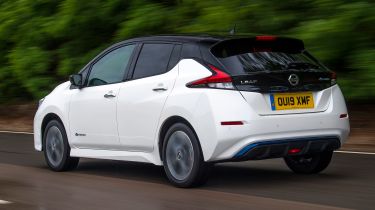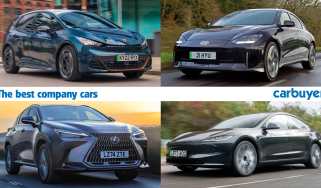Nissan Leaf hatchback - Range, charging & running costs
Rivals offer greater range and faster charging, but the Leaf remains good value for money
The second-generation Leaf has roughly double the driving range of the car that launched in 2011, despite offering more power, space and interior technology. Buried deep within the Leaf’s bodywork is either a 40kWh or 62kWh battery pack, depending on which model you go for. Nissan claims the smaller battery provides a range of up to 168 miles; we’ve found this to be somewhat accurate, with our test car returning around 150 miles on a charge.
The larger 62kWh battery model – badged ‘e+’ – is exclusive to higher-spec N-Connecta and Tekna trims and is said to return up to 239 miles of range. This is ahead of rivals such as the Peugeot e-2008 and Vauxhall Mokka Electric which both can travel around 209-215 miles before needing to be plugged in. In its Long Range specification, the MG4 can manage 281 miles on a single charge, though, and only costs around £500 more than an entry-level Leaf Acenta with the 40kWh battery pack.
Both versions of the Nissan Leaf get access to DC rapid charging, maxing out at 50kW for the standard car and 100kW for the e+. Topping up both from 10-80% at their maximum speeds using a compatible public charger will take around half an hour, while a full charge at a 7kW home wallbox will take between six-and-a-half to 10 hours, depending on which battery size you choose.
More reviews
In-depth reviews
Road tests
Used car reviews
Of course, like all other electric cars (EVs), the Nissan Leaf is exempt from paying road tax (VED) until 2025. It also escapes paying things like the London Congestion Charge and daily ULEZ tariff, which helps slightly offset the Leaf’s inflated asking price over that of a traditional petrol or diesel family hatchback.
Insurance groups
Electric cars tend to be rather expensive to insure; every Nissan Leaf finds itself in insurance group 21 – bar the e+ N-Connecta which occupies group 25. While this is higher than that of an equivalent petrol-powered family car, the Leaf should still be cheaper to cover than the Volkswagen ID.3 which spans groups 25-30 and the MG4 which sits in groups 27-29.
Warranty
Nissan models come with a standard three-year/60,000-mile warranty and the Leaf offers the same coverage. However, it has a dedicated EV warranty to cover electrical items such as the motor and battery for five years or 60,000 miles and on top of that, the battery is guaranteed to retain 75% of its charging capacity for eight years or 100,000 miles. This matches brands like Volkswagen, but falls a long way short of the seven-year warranty Kia provides. If you think it’s too short, you can opt to extend it to five years, but this costs extra.
Servicing
With far fewer moving parts than a petrol or diesel model, servicing the Leaf should be relatively easy and quick. As discussed above, it should also be cheaper, with no expensive consumables like oil, spark plugs or cambelts and many components like tyres and brakes lasting longer too.










